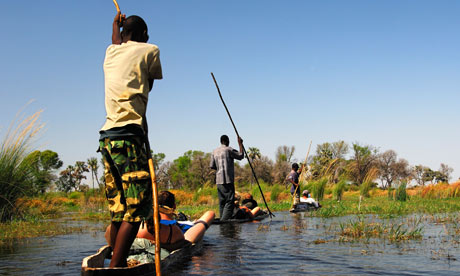
The sound of a mokoro canoe passing through reeds is somewhere between a hiss and a swish, with long rasping notes as the hull hones itself against a sharp leaf-blade. Mix in the whirr of duck wings, the chirrup of a bee-eater, the grunt-grunt-whoop of a distant hippo, and you have the soundtrack to the Okavango delta, one of the most wonderful wetlands in the world.
My point of embarkation into this aqueous paradise is Seronga in northern Botswana. As backwaters go it is both extremely watery, because of the rains, and very backward. Defunct vehicles decay in yards. Shops offer little but charge a lot.
But I chose to use this, the delta's back door, rather than fly direct to a luxury lodge – Botswana is usually one of Africa's most expensive safari destinations. I'd been attracted by the "community-based tourism" tag used by my hosts, the Okavango Polers Trust. The trust was set up in 1998 with a little prompting from a passing New Zealander, Susan Sainsbury, who suggested that Seronga's mokoro polers brand themselves as the affordable way to explore the area. The trust became a target for development funding and consultancy, and started to grow. Chalets and a campsite were built; a motorboat and a safari truck purchased with the help of African and EU grants. So far, so feelgood.
But when I arrive at Mbiroba Camp, the welcome lacks lustre. I'm partially at fault: I've come a day early and there's only a thatched rondavel available. It is grubby and illuminated by a single lopsided lamp that spills more paraffin than light. Dinner is lukewarm bolognese.
Next morning I discover there's a stealth surcharge of 25% if you pay for the mokoro trip in dollars, and I haven't brought enough Botswanan pula. But I've come a thousand miles (from Lusaka, Zambia) to see the delta, so there's no way I'm turning back now.
To preserve the delicate ecological balance of the delta, fishing is tightly controlled, grazing cattle and hunting are no longer permitted. But Calvin, our poler and guide, isn't complaining. Poling is more lucrative than fishing or farming. Calvin (real name Mayengi) is a genuine enthusiast for the delta's copious flora and fauna. He's as tickled as I am when a water monitor lizard plunges into the water as we pass.
Calvin lands us safely at Chief's island, our base for the next two days. Tents erected, firewood collected, dunny dug – this is strictly no-frills bush camping – we head off again in the mokoro. Calvin moors up and raps on the hull with his pole. After a short delay, a brace of hippos appear in the open water. One large, one small, they display their generously proportioned teeth and tonsils (in displeasure) and puff and blow like steam locos. Bulls are fiercely territorial, so we don't dally when Dad's massive bonce begins to drift in our direction.
Signs of beastly activity are plentiful on the next day's walk: spoor here, tracks there, warthog wallows, but after an hour's march I reconcile myself to a day of no-shows. It's the downside of seeing the delta at its most verdant – spotting animals is difficult. The best time to visit, Calvin says, is May.
Suddenly we hear a noise like an aircraft loo flushing, but longer. Calvin does a silent dance of excitement. Fifty feet away are two snoring elephants. Other members of the troop are grazing a short way off. We make other sightings too: greater kudu and zebra, baboons and reedbuck, bulbuls and drongos.
Back at Seronga I try to reconcile the magic of the mokoro trip with the shambolic air of the rest of the set-up. But it's hopeless. The problems with catering and housekeeping are just the beginning. I'm told the polers' motorboat, used to bring in guests, has been seized by creditors. The reason for this year's 50% price hike is becoming clear.
So what does the trust do for the community? Simba, the camp manager, says the polers lend out their vehicles, make small donations to locals, support the school prize-giving. It doesn't sound like much.
It's probably premature to expect a town that's off the grid, and has low literacy and high HIV levels, to be full of model social entrepreneurs. But when it comes to the actual delta trips, I've no qualms in giving Seronga's polers an alpha all the way.
Essentials
• Access to the Okavango's eastern panhandle is by charter flight from Gaborone or Johannesburg to Shakawe, then boat from Sepupa to Seronga. The mokoro camping trip with the Okavango Polers Trust (267 6876 861) costs about £150 for two, but you have to provide your own tent, bedding and food. Day trips are £65. Rondavels at Mbiroba Camp are £23pp; chalets £33pp, B&B.

